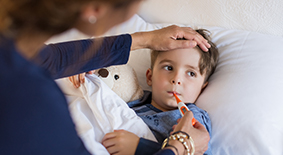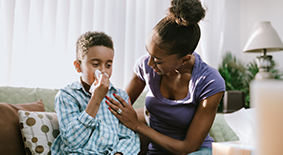Treating Your Child’s Flu Symptoms at Home
Reviewed 10/10/2024
Since caring for a child or infant with the flu can often be a bit overwhelming, it’s important for parents to brush up on the do’s and don’ts of treating their kid’s symptoms at home.
When your child gets the flu, it's certainly no fun. And parents often worry about how to safely treat their child's flu symptoms at home. It can be a bit overwhelming to figure out which medications are best, if they are staying hydrated enough and when their fever may be too high.
“When it comes to caring for a child at home who is fighting the flu, it’s not just about which medicines to take,” explained Stephanie M. Jernigan, MD, Co-Chief of Medicine and Campus Medical Director at Children’s Healthcare of Atlanta Arthur M. Blank Hospital. “Parents should also be aware of whether their child is drinking enough fluids and if their fever spikes to dangerous levels.”

Is my child hydrated enough?
Kids need to drink plenty of fluids when they are fighting the flu. This is the first line of defense if you're looking at natural treatments for the flu. Some experts say they may need as many as four to five cups of fluid each day; fluids can mean both drinks, like water and diluted apple juice, and certain foods, like gelatin, soup or popsicles.
And if your child is refusing to eat or drink, you may have to get a little more creative. We suggest putting the fluid in a fun cup, letting them use a straw or maybe even letting them “drink” juice or slushies in a bowl with a spoon.
It’s important to watch out for dehydration symptoms too. Contact your pediatrician if your child:
- Doesn’t play as much as usual.
- Isn’t urinating as much as usual.
- Has dry mouth.
- Cries without tears.
- Is sleepy or listless.
- Is fussy or cries more than usual.
Parents should always think twice before giving a child medication, as certain amounts or types of medicines can be fatal to children if not given properly.
Do antibiotics work against the flu?
No. Antibiotics will not work for the flu because the flu is a virus, not a bacterial infection.
Should my child get an antiviral?
Antiviral medications like Tamiflu can help alleviate symptoms of the flu, but have risk of side effects in children. Your child’s doctor will closely review their medical history to see if they have a risk of serious infection from the flu that might benefit from an antiviral. Your child’s doctor will weigh the benefits and the potential side effects before prescribing an antiviral.
The do’s of giving your child over-the-counter medication for flu
- Do give them acetaminophen, such as Tylenol or another equivalent store brand.
- Do give them children’s ibuprofen, such as Motrin, Advil or another equivalent store brand. Hydration is very important with this type of medication.
- Do read the product label to see the appropriate dose of medicine for your child’s weight and how frequently it should be given.
- Do check with your pharmacist or pediatrician if you have questions about dosage or frequency.
The don’ts of giving your child over-the-counter medication for flu
- Don’t give your child aspirin or aspirin-containing products if they might have the flu. These include all brands and types of the following:
- Alka-Seltzer
- Anacin
- Bayer
- BC Powder
- Doan’s
- Ecotrin
- Excedrin
- Goody’s
- Kaopectate
- Pamprin
- Pepto-Bismol
- St. Joseph’s
- Vanquish
- Don’t give your child cough or cold medicine when also giving them fever-reducing medicines unless under the direction of their doctor. Cough and cold medicines do not treat the flu, and some ingredients may cause serious side effects for children younger than 6 years old.
If at any point you have questions about dosages or combining certain types of medications, don’t hesitate to contact your child’s pediatrician or reach out to your pharmacist. They are the experts in treating children of all ages and sizes, and they will know best about how to properly give your child medicine to help fight off flu symptoms.
A child with the flu tends to experience fevers ranging from 100°F (37.8°C) or higher.
Most fevers are harmless, but parents may still worry whether their child needs medicine to help lower their temperature. Here’s a helpful guide:
- Infants younger than 3 months old whose temperature reaches 100.4°F (38°C) or higher should be evaluated by a doctor because fevers in infants can indicate a serious illness.
- Kids between 3 months and 3 years old with a fever of 102.2°F (39°C) or higher also require a call to your pediatrician.
“Either ibuprofen or acetaminophen can be used to help reduce your child’s fever and ease body aches and pain,” Dr. Jernigan said. “However, these medications have age and weight guidelines and should not be combined without direction from a healthcare professional, as it can be very dangerous for your child.”
Tylenol is made out of acetaminophen, which can also be found in cold and cough medicines like DayQuil and Mucinex, so make sure you are not giving your child too much acetaminophen by combining the two.
While treating your child’s flu symptoms at home may not be easy—and oftentimes is a little overwhelming—we’re here to help. And remember, it’s never too late to get a flu shot or to encourage family and friends to do the same.
What if my child has the flu and COVID-19?
It’s rare for someone to have both of these illnesses at the same time, but it is possible. Most of the treatment strategies for COVID-19 symptoms are the same as for the flu.
Keep anyone with COVID-19 in a separate room if possible, and make sure you both wear a mask. Don’t share dishes or eating utensils. And make an extra effort to keep your home clean, opening windows if possible for ventilation and disinfecting surfaces like tables and countertops as well as commonly touched objects like doorknobs, faucets and light switches.
Helping Parents Take On Flu Season
This content is general information and is not specific medical advice. Always consult with a doctor or healthcare provider if you have any questions or concerns about the health of a child. In case of an urgent concern or emergency, call 911 or go to the nearest emergency department right away. Some physicians and affiliated healthcare professionals on the Children’s Healthcare of Atlanta team are independent providers and are not our employees.
Contact Us 404-785-KIDS (5437)


